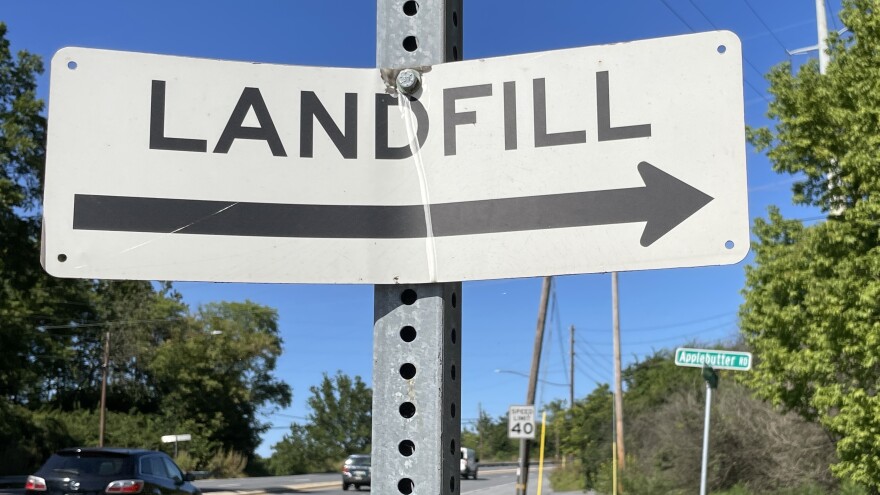EASTON, Pa. — A recent campaign filing shows Bethlehem Landfill’s parent company contributed $89,000 to the super PAC Responsible Solutions for Pennsylvania in the weeks following the Nov. 7 general election.
RSPA, out of Westchester County, New York, by definition is an “expenditure-only” political committee that can bring in unlimited money from individuals, corporations, unions and other PACs to support political activity.
It can't donate to a candidate's campaign directly.
The landfill, at 2335 Applebutter Road, and its potential expansion were polarizing topics in the race for Lower Saucon Township Council.
The supporting Republican potentials didn’t grab enough votes to secure spots on the incoming panel, and an opposing Democratic slate is set to take the majority with three of the five council seats come January.
The Republicans — Mark Inglis, Sandra Yerger and Susan Blair — all have all publicly said they’ve never made contact with the super PAC or accepted money from the Bethlehem Landfill or any associated group.
“Responsible Solutions for Pennsylvania agrees with the majority of citizens in Lower Saucon Township who are in favor of fully funding the police, supporting local schools and charities and preserving the land for future generations."Andrew Moss, chairperson for Responsible Solutions for Pennsylvania and Northeast Division government affairs manager for Waste Connections
The campaign filing document lists RSPA’s cash balance as totaling $101,505.24 and its unpaid debts at $82,415.36.
Those debts were incurred from Dec. 12, 2022, to Nov. 14, 2023, and include the following, in chronological order:
- $27.90 for postage
- $17.97, twice across two months, for website services
- $44, twice across two months, for a post office box rental
- $23,000 for “Get Out the Vote Efforts” and printing, digital advertising and political consulting
- $3,283.10 for design, copywriting, printing and delivery of door hangers
- $23,000 for door programs, digital advertising and “management fee”
- $11,000 for digital advertising and video production
- $16,580.42 for copywriting, design, printing and other mailing expenses
- $5,400 for printing and production
The smaller charges are credited to Andrew Moss, the RSPA chairman and Northeast Division government affairs manager for Waste Connections, the landfill’s parent company based out of The Woodlands, Texas.
“Responsible Solutions for Pennsylvania agrees with the majority of citizens in Lower Saucon Township who are in favor of fully funding the police, supporting local schools and charities and preserving the land for future generations,” Moss wrote in an email before the November election.
Moss did not immediately respond to requests for further comment.
The larger charges in the thousands of dollars are credited to Fulcrum Campaign Strategies based in Tampa, Florida.
RSPA also has dumped money into previous township council races.
A ways to go
In August, Lower Saucon Council approved rezoning measures to change 275 acres of farmland near the landfill into a light industrial area, also allowing landfill uses by right instead of by a special exception as typically required.
The Phase Five Expansion plans also call for 171 acres of total disturbance, 193 acres to be conserved, the planting of 4,000 trees and the dump’s peak height to remain at 725 feet above sea level.
However, landfill officials also must go through a multi-year evaluation from the state Department of Environmental Protection before any final development plans come before officials.
Bethlehem Landfill attorney Maryanne Garber has said this newest plan would simply allow her client to keep business running as usual, while also adding 20 years to the dump’s lifespan.
How landfill fits township budget
Lower Saucon officials have calculated a rise of $100,000 in landfill host fees to come in 2024, totaling $2.3 million for the year.
The township budget, approved last week, lists its primary revenue sources as landfill host fees taking up 21.2% of the overall pot, which sits behind earned income, local services and real estate transfer taxes at 33.5% and in front of real estate taxes at 15.4%.
Before that budget was approved, council President Jason Banonis pitched the idea of a property tax cut, citing over $9 million in township reserves and the additional funding coming in from the landfill.
That property tax cut — from 4.39 to 3.64 mills — passed with a vote of 4-1, with Councilwoman Priscilla deLeon opposing.


